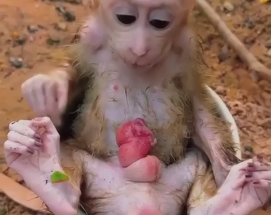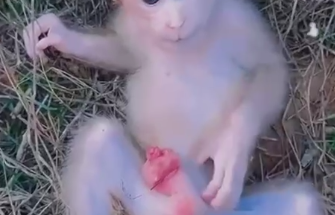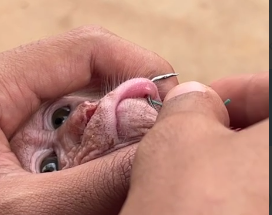There are moments in life that catch us off guard—moments so raw, so heartbreaking, that they leave an imprint on the soul. One such moment happened when I witnessed a baby monkey crying and struggling in a river, only to slowly disappear beneath the water. It was not just a sad sight—it was a painful reminder of how fragile and innocent life can be, regardless of species. My heart hurt deeply, and that image has stayed with me ever since.
It’s easy to scroll past animal videos on social media, to see animals in the wild or in sanctuaries, and to forget that they feel, hurt, and fear just like we do. But seeing a vulnerable baby monkey—tiny, confused, and terrified—gripping for life, crying in desperation as water pulled it away, made that truth undeniable. It wasn’t just “a monkey.” It was a baby, scared and alone. And something inside me shattered watching that life fade away without anyone to help it.
The cry of the monkey wasn’t just a sound—it was a scream for help. A scream that echoed the universal fear of being abandoned, the instinctive terror of death, and the innocent confusion of not knowing why the world is so cruel. Animals may not speak our language, but their emotions are loud and clear when we allow ourselves to see them. That baby monkey cried like any child would—eyes wide, limbs flailing, hoping for a rescue that never came.
I couldn’t help but wonder: Where was its mother? Was she gone? Did she try to save it but fail? Was she still nearby, crying out in helpless agony, just like any parent would? The thought haunted me. The bond between a mother and her baby in the animal world is often as strong as our own. To imagine that mother watching her child drown, unable to help, only deepened my sorrow.
Many people think animals are lesser beings, incapable of deep emotions or consciousness. But anyone who has truly looked into an animal’s eyes knows otherwise. That baby monkey, in its final moments, showed fear, pain, and a longing to live. It wasn’t just instinct—it was emotion. It had a soul, even if we never gave it a name.
There was something especially tragic about how small the monkey was, how new to the world. A baby, likely not more than a few weeks old. It should’ve been climbing trees, playing in the sun, learning how to survive. Instead, it faced a brutal death. Alone. Cold. Scared. No creature deserves to go like that.
I thought about how that moment reflects so much of the cruelty in our world. Animals suffer because of human neglect, destruction of habitats, pollution of rivers, and indifference. That river—was it once clean and safe? Did humans ruin it? Did the baby monkey fall because of a weakened branch, a lost mother, or human activity nearby that disturbed its troop? We’ll never know. But we must ask ourselves—how often are we the indirect cause of such tragedies?
Grief is often reserved for human loss, but the pain I felt watching that baby monkey drown was real. It was grief, even if society doesn’t always recognize it. It hurt because that baby didn’t just lose its life—it lost its chance. Its chance to grow, to live, to love, to be part of the forest, to play with siblings, to find safety in a mother’s arms.
That moment also sparked guilt. Could something have been done? Could someone nearby have helped? Was there a way to save it? Often, we feel helpless in the face of nature’s cruelty, but maybe we’re only helpless because we’ve learned to look away. We scroll, we watch, we forget. But that pain we feel? That hurt in the heart? It’s a sign we still care, and caring must lead to action.
If that baby monkey’s tragic death teaches us anything, it’s that compassion should have no limits. Whether it’s a human child or an animal, suffering is suffering. We must open our hearts to the cries we usually ignore. We must do more to protect the voiceless, to care for the creatures who share this planet with us.
I found myself wishing the monkey had never fallen into the river, or that a kind human had been close enough to pull it out in time. I wished someone had held it close, dried it off, comforted it, and returned it to its mother. I wished it had another chance. But life doesn’t always give second chances. Sometimes all we’re left with is pain and a lesson.
Since that day, I’ve looked at animals differently. I’ve looked at rivers differently. I’ve started seeing the world not just through human eyes, but with empathy for every creature trying to survive. I’ve realized how fragile life is, and how even the smallest moments—like a baby monkey crying—can teach us more than any textbook ever could.
My heart still hurts. It probably always will. But maybe that pain has a purpose. Maybe it’s a reminder that every life matters, that we must protect the vulnerable, and that true humanity lies in how we treat those who have no voice. The baby monkey is gone, but its cry still echoes in my soul. And I vow to never ignore it again.


